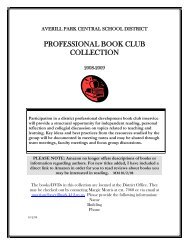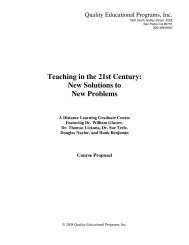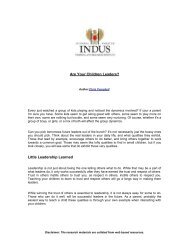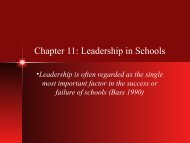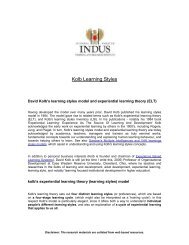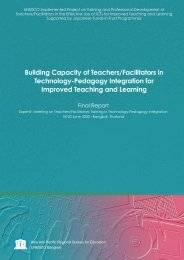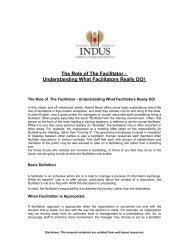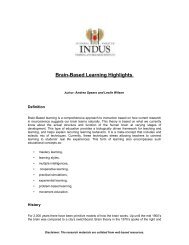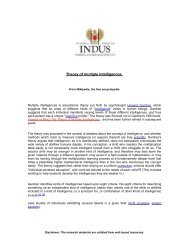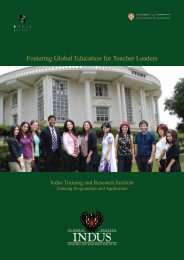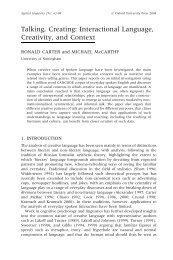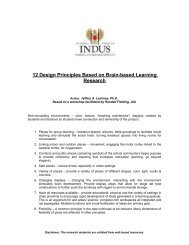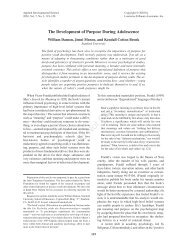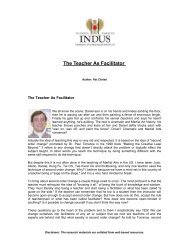Primary Years Programme Making the PYP happen - ITARI
Primary Years Programme Making the PYP happen - ITARI
Primary Years Programme Making the PYP happen - ITARI
- No tags were found...
You also want an ePaper? Increase the reach of your titles
YUMPU automatically turns print PDFs into web optimized ePapers that Google loves.
<strong>Making</strong> <strong>the</strong> <strong>PYP</strong> <strong>happen</strong><br />
Decreased emphasis on:<br />
How are social studies practices changing<br />
Increased emphasis on:<br />
topics chosen by individual teachers, pet<br />
topics, topics that have always been done in<br />
<strong>the</strong> grade level<br />
teachers planning in isolation<br />
teacher-led learning<br />
single discipline based units<br />
units which focus on western civilisation and<br />
<strong>the</strong> developed world<br />
a survey approach to topics and knowledge<br />
areas<br />
a reliance on single sources<br />
political and military perspectives<br />
factual information as an end in itself<br />
skills taught and practised in isolation<br />
checklists of hierarchies of discipline-specific<br />
micro skills<br />
a narrow range of teaching and learning<br />
strategies<br />
activities which result in superficial or tangential<br />
social studies learning; activities which are<br />
included because <strong>the</strong>y are fun; activities which<br />
are included because <strong>the</strong>y are hands on<br />
textbooks and worksheets as <strong>the</strong> predominant<br />
resources<br />
end of unit, end of chapter assessment<br />
traditional forms of teacher-designed<br />
assessment only<br />
written assessment measures<br />
tests or examinations signalling <strong>the</strong> end of<br />
<strong>the</strong> unit<br />
teaching about responsibility and <strong>the</strong> need<br />
for action<br />
a coherent articulated school-wide programme, based on<br />
agreed significant content<br />
teachers planning in cross-grade and cross-school teams<br />
open-ended inquiry and real-life investigations, in which<br />
teachers and students are all part of <strong>the</strong> community of learners<br />
units of inquiry which lend <strong>the</strong>mselves to intradisciplinary<br />
(across <strong>the</strong> disciplines of social studies) and transdisciplinary<br />
(across <strong>the</strong> areas of <strong>the</strong> curriculum) investigations<br />
units which build in local, multicultural, international<br />
and global dimensions<br />
in-depth coverage of units chosen, with an emphasis on<br />
“less is more”<br />
<strong>the</strong> use of multiple sources presenting multiple perspectives<br />
social, cultural and gender perspectives<br />
units of inquiry which focus on students constructing<br />
meaning, and expanding and deepening <strong>the</strong>ir knowledge of<br />
concepts and <strong>the</strong>ir understanding of <strong>the</strong> social world<br />
skills taught, practised and applied in <strong>the</strong> context of<br />
inquiry<br />
<strong>the</strong> development and application of such macro skills as<br />
decision making, problem solving, reflective learning,<br />
communicating, thinking critically and creatively and<br />
researching<br />
teaching and learning strategies chosen from a wide<br />
range of possibilities with an emphasis on inquiry<br />
strategies and <strong>the</strong> deepening of understanding<br />
rigorous activities directly linked to <strong>the</strong> driving questions<br />
of <strong>the</strong> inquiry<br />
using a variety of primary sources and documentation,<br />
people, artifacts, field trips, surveys and interviews as well<br />
as sources such as literature, video tapes, films and<br />
computer resources<br />
assessing student understanding early and often as well<br />
as at <strong>the</strong> end<br />
a variety of formative and summative assessment<br />
approaches, including performance assessment<br />
a variety of tasks suited to different learning styles<br />
<strong>the</strong> end of <strong>the</strong> units being signalled by reflection by<br />
students and teachers<br />
empowering students to be responsible and to take action<br />
Figure 29 <strong>PYP</strong> practices: social studies<br />
86 © IBO 2000



